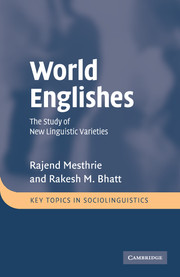Book contents
- Frontmatter
- Contents
- List of figures
- List of tables
- Preface
- Acknowledgements
- List of abbreviations
- 1 History: the spread of English
- 2 Structural features of New Englishes I: morphology and phrasal syntax
- 3 Structural features of New Englishes II: cross-clausal syntax and syntactic theory
- 4 More on structure: lexis and phonology
- 5 Pragmatics and discourse
- 6 Language contact and language acquisition issues in New English research
- 7 Conclusion: current trends in the spread of English
- Glossary
- Bibliography
- Author index
- Subject index
1 - History: the spread of English
Published online by Cambridge University Press: 05 September 2012
- Frontmatter
- Contents
- List of figures
- List of tables
- Preface
- Acknowledgements
- List of abbreviations
- 1 History: the spread of English
- 2 Structural features of New Englishes I: morphology and phrasal syntax
- 3 Structural features of New Englishes II: cross-clausal syntax and syntactic theory
- 4 More on structure: lexis and phonology
- 5 Pragmatics and discourse
- 6 Language contact and language acquisition issues in New English research
- 7 Conclusion: current trends in the spread of English
- Glossary
- Bibliography
- Author index
- Subject index
Summary
INTRODUCTION: THE ENGLISH LANGUAGE COMPLEX
This book is concerned with an important topic in modern Sociolinguistics: the globalisation of English and the linguistic consequences of this process. The rise of English can be studied from a number of perspectives:
as a topic in Historical Linguistics, highlighting the history of one language within the Germanic family and its continual fission into regional and social dialects;
as a macro-sociolinguistic topic ‘language spread’ detailing the ways in which English and other languages associated with colonisation have changed the linguistic ecology of the world;
as a topic in the field of Language Contact, examining the structural similarities and differences amongst the new varieties of English that are stabilising or have stabilised;
as a topic in political and ideological studies – ‘linguistic imperialism’ – that focuses on how relations of dominance are entrenched by, and in, language and how such dominance often comes to be viewed as part of the natural order;
as a topic in Applied Linguistics concerned with the role of English in modernisation, government and – above all – education; and
as a topic in cultural and literary studies concerned with the impact of English upon different cultures and literatures, and the constructions of new identities via bilingualism.
- Type
- Chapter
- Information
- World EnglishesThe Study of New Linguistic Varieties, pp. 1 - 38Publisher: Cambridge University PressPrint publication year: 2008

